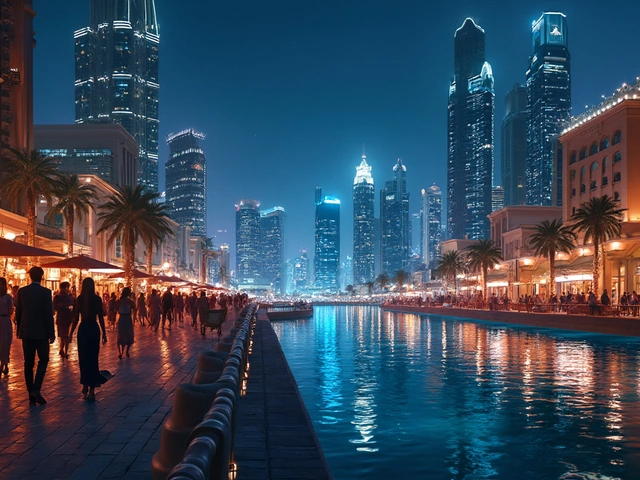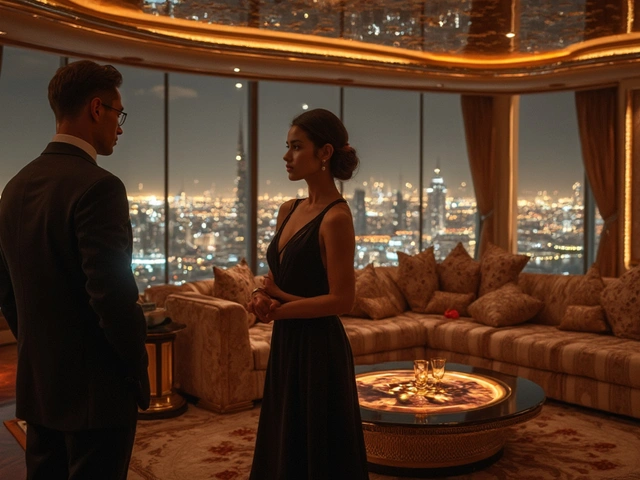
When you hear "African girls in Dubai," what comes to mind? Maybe glamorous photos from Dubai Marina, or rumors about nightlife, or even misleading headlines that reduce their lives to one dimension. The truth is far more complex - and far more human.
Who Are African Girls in Dubai?
African girls in Dubai aren’t a monolith. They’re students from Nigeria studying biomedical engineering at Zayed University. They’re nurses from Kenya working night shifts at Dubai Hospital. They’re entrepreneurs from Ghana running online boutiques that ship to London and Lagos. They’re teachers from Uganda tutoring children in Arabic and English. They’re singers from South Africa performing at rooftop lounges after their day jobs.
According to the UAE Ministry of Human Resources and Emiratisation, over 1.2 million Africans live in the UAE as of 2025 - about 15% of the total expat population. A significant portion are women between the ages of 18 and 35. Most arrived legally on work visas, student visas, or family sponsorship. They didn’t come for fantasy. They came for opportunity.
Why Dubai? The Real Reasons
Why not London? Why not Toronto? Why Dubai?
For many African women, Dubai offers something rare: a place where your nationality doesn’t automatically lock you out of opportunity. It’s not perfect - but compared to many Western countries with strict immigration quotas, Dubai is open. You can get a job as a receptionist, a secretary, or a sales associate with a degree from Accra or Kampala. You can open a bank account without needing a local guarantor. You can rent an apartment without a local sponsor.
Salaries aren’t always high, but they’re often higher than what’s available back home. A Nigerian nurse in Dubai might earn 6,000 AED a month - more than triple what she’d make in Lagos. A Ghanaian student on scholarship can live on 2,500 AED a month and still send money home. That’s life-changing.
And then there’s safety. For many African women, Dubai feels secure. Street harassment is rare. Public transport runs late. Police respond quickly. In cities like Nairobi or Johannesburg, walking home alone at night carries real risk. In Dubai, it doesn’t.
Living Arrangements: From Shared Flats to Solo Apartments
Where do African girls in Dubai live? It depends on income, job type, and personal choice.
Many start in shared apartments in Deira, Bur Dubai, or Al Quoz - places with affordable rent and easy access to African grocery stores, halal butchers, and churches or mosques. A single room in a three-bedroom flat might cost 1,800 AED a month. Utilities, internet, and food add another 1,200 AED.
As they save, many move out. A Kenyan teacher working at an international school might rent a studio in Jumeirah Lakes Towers. A Nigerian influencer with a growing Instagram following might live alone in Discovery Gardens. Some live with relatives. Others live with roommates they met through church or university.
What’s common? Most keep their spaces clean, organized, and full of photos from home. You’ll find kente cloth on the wall, Nigerian spices in the kitchen, and WhatsApp groups buzzing with updates from back home.

Work and Careers: Beyond the Myths
Let’s clear up a myth right now: not all African girls in Dubai are in the service industry. In fact, most aren’t.
The top five industries employing African women in Dubai are:
- Healthcare (nurses, lab technicians, physiotherapists)
- Education (teachers, teaching assistants, tutors)
- Retail (sales, customer service, store managers)
- Hospitality (front desk, housekeeping, event coordinators)
- Freelancing (graphic design, content writing, social media management)
There are women working in tech, law, finance, and even aviation. A Ghanaian woman works as a flight attendant for Emirates. A South African runs a digital marketing agency for Middle Eastern brands. An Ethiopian woman is a licensed architect designing affordable housing projects in Dubai South.
Yes, some work in hospitality or entertainment. But that’s not because they’re forced or trapped - it’s often because those jobs pay well, offer flexible hours, and allow them to support family members back home. One Cameroonian woman told me she works as a cocktail server at a hotel bar three nights a week so she can study accounting online during the day. She’s on track to become a certified CPA by 2026.
Culture, Community, and Connection
African women in Dubai have built networks that keep them grounded. There are Nigerian women’s associations in Al Barsha. Kenyan book clubs in Al Quoz. Ghanaian prayer groups in Jebel Ali. Ethiopian coffee mornings in Al Nahda.
These aren’t just social circles - they’re survival networks. They help new arrivals find housing. They warn each other about shady landlords. They share job leads. They organize legal aid for visa issues. They celebrate Eid together, Christmas together, and Independence Days from home.
There are also African-run businesses thriving: hair salons specializing in natural hair, African food delivery services, tailors who make dashikis and kaftans, and beauty shops selling shea butter and black soap.
On weekends, you’ll find groups of African women at Dubai Creek, picnicking with jollof rice and plantain chips. Or at the Dubai Frame, taking selfies with the city skyline behind them. Or at the Dubai Mall, browsing Zara while texting their sisters back home: "You won’t believe how cheap this is here."

The Challenges They Face
Life isn’t easy. There are struggles no Instagram post shows.
Visa dependency is a constant stress. Your job is your residency. Lose your job, and you have 30 days to find another or leave. Many women live in fear of being fired - especially if they report harassment or unfair treatment.
Some face racism. Not always overt, but subtle: being asked if they’re "from Africa" like it’s a surprise, being assumed to be a cleaner or a maid, being ignored in upscale stores. One Ugandan student said she once walked into a luxury boutique and was followed by a security guard for 20 minutes - just because she was Black.
Loneliness hits hard. Many are thousands of miles from family. Holidays can be quiet. Birthdays go uncelebrated. Some cry on Sundays, watching videos of their children back home.
And then there’s the stigma. In some African communities, women who move abroad are seen as "too ambitious" or "loose." Some are told they’re "selling themselves" for money. Others are blamed if they’re single and living alone.
What No One Tells You
Here’s what nobody talks about: African girls in Dubai are changing the narrative - not just for themselves, but for the continent.
They’re sending home more than money. They’re sending ideas. They’re bringing back business models, education strategies, and leadership styles they learned here. A Nigerian woman who managed a team in Dubai returns home to start her own logistics company. A Tanzanian nurse who learned electronic health records in Dubai trains her colleagues back home.
They’re also challenging gender norms. Many are the first women in their families to live alone, earn their own money, travel internationally, or make major financial decisions. Their confidence is reshaping expectations.
And they’re not waiting for permission to succeed. They’re starting YouTube channels about life in Dubai. They’re writing blogs. They’re creating TikToks that show the real side of expat life - not the party clips, but the quiet moments: studying after work, calling home at 2 a.m., saving up for a flight to see their mother.
What You Should Know - And What You Shouldn’t Assume
If you’re thinking about visiting Dubai and wondering what African women are "really doing" here - stop assuming. Don’t look for "African girls" in clubs or beaches. Look for them in classrooms, hospitals, offices, and homes.
Don’t believe the stories that paint them as victims or objects. Most are agents of their own lives. They’ve made hard choices. They’ve worked hard. They’ve built something.
And if you’re an African woman thinking of coming to Dubai? Do your research. Get a legal visa. Find a community. Save your money. Don’t rush into relationships with strangers. Trust your gut. You’re not here to be seen - you’re here to build.
Dubai doesn’t owe African women anything. But for many, it’s become a place where they can finally be seen - not as stereotypes, but as people with dreams, skills, and stories worth telling.
Are African girls in Dubai safe?
Yes, for the most part. Dubai is one of the safest cities in the world for women, regardless of nationality. Police respond quickly to reports of harassment or assault. Public spaces are well-lit and monitored. That said, no city is 100% risk-free. African women in Dubai still face racism, visa dependency, and cultural isolation - but physical safety is rarely the biggest concern.
Can African women work legally in Dubai?
Absolutely. African women hold legal work visas across industries: healthcare, education, tech, retail, and hospitality. Employers are required to sponsor visas, and the government regularly audits companies to ensure compliance. Many African women work for multinational companies like Emirates, DHL, and Accenture. The key is ensuring your employer is legitimate and your contract is in writing.
Do African girls in Dubai send money home?
Yes, and it’s a major part of their lives. Remittances from the UAE to African countries totaled over $7 billion in 2024, with Nigeria, Kenya, Ethiopia, and Ghana receiving the largest shares. Many women send 50% or more of their income home to support parents, siblings, or children. Services like Western Union, WorldRemit, and local money transfer agents are widely used.
Is it true that African girls in Dubai are involved in sex work?
A small minority may be, but it’s not representative. Sex work is illegal in the UAE and carries severe penalties, including deportation and jail. Most African women in Dubai are working in legal, visible jobs. Media and online content that focus on this narrative are often sensationalized, misleading, or outright false. The vast majority are students, nurses, teachers, and entrepreneurs.
How do African girls in Dubai connect with each other?
Through community groups, religious organizations, WhatsApp groups, and social events. Churches and mosques often host African women’s gatherings. There are also formal associations like the Nigerian Women’s Association of Dubai and the Kenyan Women’s Network. Many connect through shared hobbies - cooking, dancing, or book clubs. Social media is also a lifeline - Instagram and TikTok accounts like @AfricanInDubai and @DubaiNaijaGirls showcase real stories, not stereotypes.


